
As of April 2023, the U.S. is home to over 1,100 active integrated delivery networks (IDNs), a witness to their growing influence in healthcare. With such an abundance, pinpointing the top IDNs in the U.S. is increasingly challenging.
So what is IDN?
An Integrated Delivery Network (IDN) is a network of healthcare organizations and providers that offer a range of health services across multiple care settings. IDNs are designed to provide comprehensive care coordination, from primary care to specialty services, outpatient facilities, hospitals, and sometimes even health insurance.
After extensive research, we’ve identified the top 25 IDNs, delving into what makes them stand out and where they fall short. This guide offers clear, straightforward insights into each network’s pros and cons.
Stick with us until the end, and you’ll be well-equipped to navigate the complex world of IDNs.
What’s on this page:
What is IDNs?
Integrated Delivery Networks (IDNs) are systems that combine various healthcare facilities and services, including hospitals, clinics, and care providers. They aim to offer coordinated and comprehensive care across different settings.
IDNs aim to improve patient health outcomes and enhance efficiency by integrating services, reducing redundancies, and managing costs effectively.
They often include a range of healthcare services from primary care to specialty care. Also includes inpatient and outpatient services, with the goal of providing a continuation of care to patients. This integrated delivery system allows for better data sharing, care coordination, and overall management of patient health within a single network.
What are the Different Types of IDNs?
Integrated Delivery Networks (IDNs) can vary in structure, scope, and focus, leading to different types based on their characteristics and the services they provide. Here are some common types of IDNs:
Academic Medical Centers (AMCs)
These IDNs are centered around a medical school and its affiliated hospitals and clinics. They focus on providing patient care, medical education, and research. AMCs are known for their advanced treatments and specialization in complex medical conditions.
Community-Based IDNs
These networks provide a wide range of healthcare services primarily focused on serving the needs of a specific geographic community or region. They may include community hospitals, outpatient centers, and primary care clinics.
Faith-Based IDNs
Operated by religious organizations, these IDNs often focus on delivering healthcare with a particular spiritual or ethical perspective. They can range from small, local networks to large, national organizations.
For-Profit and Nonprofit IDNs
IDNs can be classified based on their operational model. Non-profit IDNs reinvest surplus revenues into the organization to improve services, while for-profit IDNs distribute profits to shareholders or investors.
National or Multi-State IDNs
These are large networks that operate across multiple states, offering a wide range of healthcare services. They can manage numerous hospitals, clinics, and specialized care facilities.
Pediatric IDNs
Specialized in children’s healthcare, these IDNs integrate services from primary pediatric care to specialized treatments for young patients. Also includes hospitals and outpatient facilities dedicated to pediatric care.
Physician-Led IDNs
These networks are primarily led and managed by physicians or physician groups. They focus on integrating care across various settings, emphasizing clinical outcomes and patient-centered care.
Quick List of 25 Integrated Delivery Networks
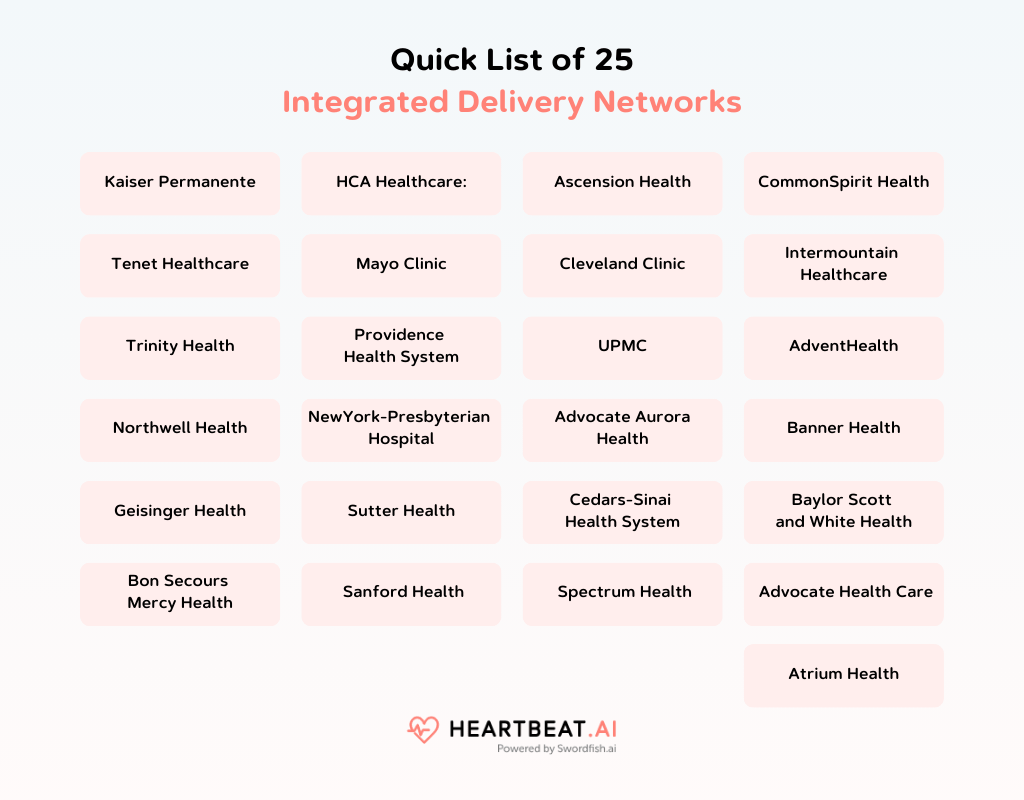
Here is a brief list of IDNs:
- Kaiser Permanente: Best for integrated care and extensive health plan options.
- HCA Healthcare: Best for a wide network of hospitals and emergency services.
- Ascension Health: Best for holistic care with a focus on community health.
- CommonSpirit Health: Best for faith-based healthcare and diverse community services.
- Tenet Healthcare: Best for varied healthcare services and extensive hospital network.
- Mayo Clinic: Best for top-ranked patient care and extensive research programs.
- Cleveland Clinic: Best for heart care and innovative, patient-centered healthcare solutions.
- Intermountain Healthcare: Best for integrated care and health technology advancements in the West.
- Trinity Health: Best for faith-based, holistic care across numerous states.
- Providence Health System: Best for diverse services with strong community health focus.
- University of Pittsburgh Medical Center (UPMC): Best for health innovation and high-quality specialty care services.
- AdventHealth: Best for extensive network with a focus on whole-person care.
- Northwell Health: Best for comprehensive care across New York with leading hospitals.
- NewYork-Presbyterian Hospital: Best for an exceptional academic medical center with cutting-edge treatments.
- Advocate Aurora Health: Best for leading health services in Illinois and Wisconsin.
- Banner Health: Best for widespread services in the West with a focus on wellness.
- Geisinger Health: Best for integrated health services with a focus on innovation.
- Sutter Health: Best for patient-centric care in Northern California with advanced technology.
- Cedars-Sinai Health System: Best for leading-edge care and research in Los Angeles.
- Baylor Scott and White Health: Best for comprehensive care with a focus on Texas communities.
- Bon Secours Mercy Health: Best for combining compassion with advanced healthcare services.
- Sanford Health: Best for rural health services with a broad reach in the Midwest.
- Spectrum Health: Best for Michigan-based innovative care and health research.
- Advocate Health Care: Best for high-quality care across Illinois with a focus on communities.
- Carolinas HealthCare System (Atrium Health): Best for leading healthcare innovation and comprehensive services in the Carolinas.
3 Best Integrated Delivery Networks: Comparison Chart
Comparing the top 3 integrated delivery network list in the U.S. for a clear understanding of their distinctive features:
| Company | Main Services | Market Presence | Sustainability Initiatives |
| Kaiser Permanente | Integrated managed care | Nationwide | Environmental stewardship programs |
| HCA Healthcare | Health care facilities | Nationwide | Energy efficiency initiatives |
| Ascension Health | Health care services, Hospitals | Nationwide | Community health initiatives |
3 Top Integrated Delivery Networks List
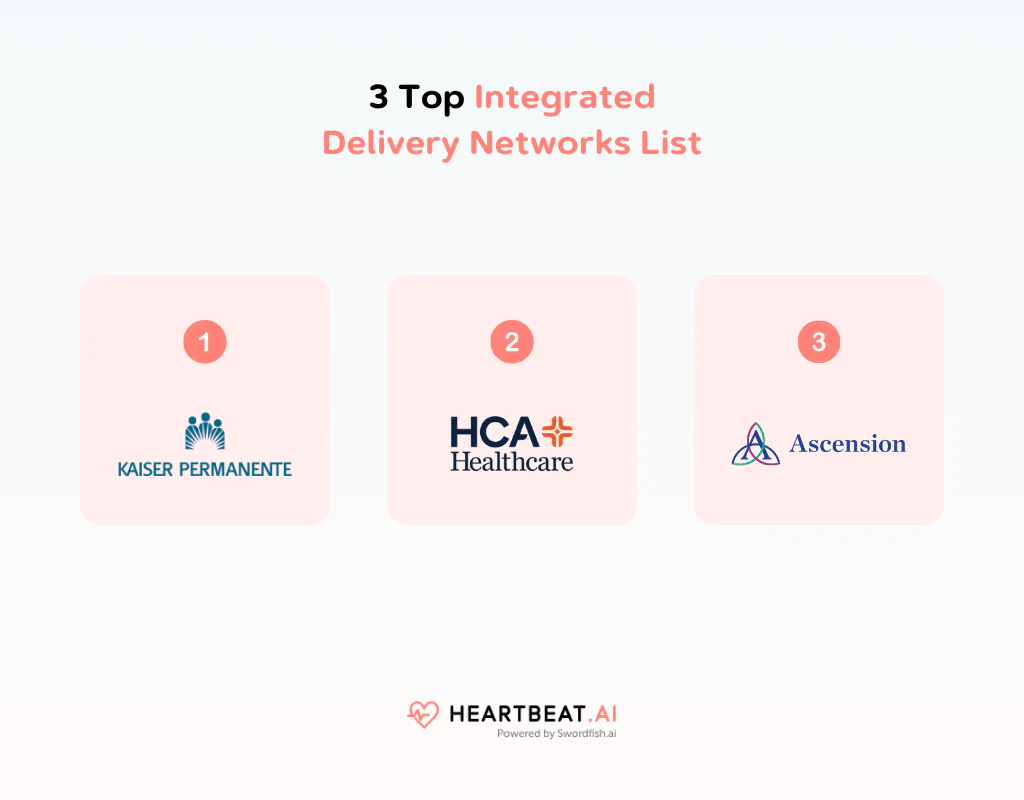
Now, we’ll explore the top 3 IDNs that are revolutionizing healthcare. Get ready for an insightful journey into the best in the industry.
1. Kaiser Permanente
Kaiser Permanente stands out as a leading integrated delivery network, offering a unique blend of healthcare services. Essentially, they combine both healthcare insurance and provider services under one roof. This approach is important because it simplifies patient care, making it more efficient and coordinated.
By having doctors, hospitals, and insurance working closely together, they ensure that patient care is seamless and integrated. This model is particularly beneficial as it reduces the hassle for patients and improves the quality of care.
Kaiser Permanente is renowned for this efficient, all-in-one healthcare system, which is why they are considered one of the best. Their model simplifies the healthcare process, making it more accessible and less stressful for patients.

About Kaiser Permanente
- Founding Team: Sidney R.Garfield, Henry J. Kaiser
- Founding Year: 1945
- Company Size: 309,662
Features of Kaiser Permanente
Here are some of the key features of Kaiser Permanente:
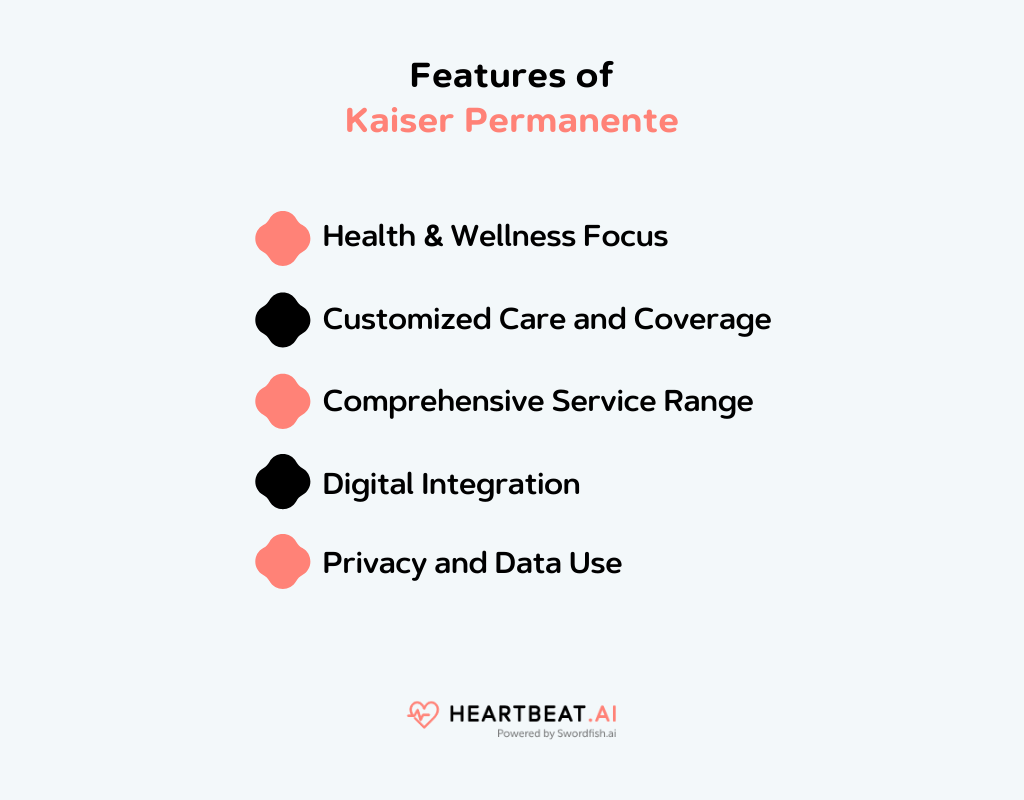
Health & Wellness Focus
Kaiser Permanente emphasizes a strong commitment to health and wellness. This is evident from their dedicated section on health and wellness. This suggests a holistic approach to healthcare, focusing not just on treatment but also on preventive care and overall well-being.
Customized Care and Coverage
They offer personalized care and coverage plans. This indicates that Kaiser Permanente customizes its services to meet the individual needs of its members. This is a significant attribute in the healthcare sector where one-size-fits-all solutions are often less effective.
Comprehensive Service Range
The webpage of Kaiser Permanente provides links to various services like finding doctors and locations, indicating a wide network of healthcare professionals and facilities. This comprehensive range of services ensures that members can access diverse healthcare services under one roof.
Digital Integration
The presence of a section for ‘Profile & Preferences’ suggests a user-friendly digital interface where members can manage their profiles and customize their preferences. This digital integration is crucial in modern healthcare for ease of access and efficient service delivery.
Privacy and Data Use
Kaiser Permanente uses web tracking technologies to enhance user experience and optimize service awareness. While this shows a commitment to utilizing technology for better service delivery, it also highlights the importance they place on privacy, as mentioned in their Privacy Statement.
Pros
- Integrated care model enhances patient coordination.
- Strong focus on preventive care and wellness.
- Strong telehealth services improve accessibility.
- Patient satisfaction ratings are generally high.
- Emphasis on research and innovation drives medical advancements.
Cons
- Limited choice of non-network providers.
- Membership is required for access to services.
Our Review of Kaiser Permanente
We’ve thoroughly researched Kaiser Permanente, and there are some aspects that stand out positively. First and foremost, their emphasis on preventive care is commendable. They promote a healthy lifestyle and offer a wide range of wellness programs.
Additionally, the convenience of having doctors, specialists, and pharmacies all under one roof makes it easy to access care.
On the downside, we noticed that appointment wait times can sometimes be a bit lengthy. It’s important to plan ahead. Also, while their integrated system is beneficial, it can sometimes feel impersonal, with limited time for in-depth discussions with healthcare providers.
2. HCA Healthcare
HCA Healthcare is a prominent player in the healthcare sector, known for operating hospitals and healthcare facilities. Their role is important because they provide essential medical services to communities, ranging from emergency care to specialized treatments.
The strength of HCA Healthcare lies in its vast network of hospitals and clinics, ensuring that quality healthcare is accessible to many people.
They stand out in the healthcare industry for their commitment to patient care, advanced medical technology, and skilled professionals. This makes them one of the best in integrated healthcare delivery.
Their ability to offer comprehensive care, from routine check-ups to complex surgeries, underlines their importance. Essentially, HCA Healthcare is a key provider ensuring health and wellness in numerous communities.

About HCA Healthcare
- Founding Team: Thomas F. First Sr., Thomas F. First Jr., Jack C. Massey
- Founding Year: 1968
- Company Size: 235,000
Features of HCA Healthcare
HCA Healthcare showcases several distinctive features that underline their commitment to healthcare and community service. Here are some of the key aspects:
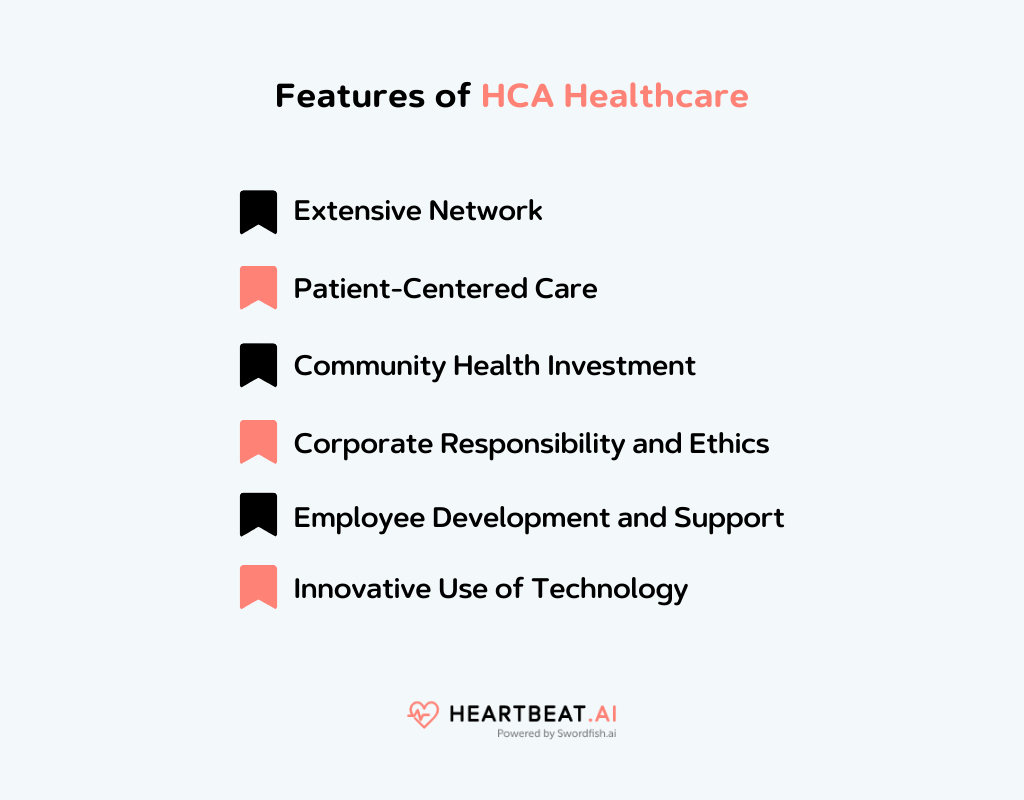
Extensive Network
HCA Healthcare operates over 2,000 sites of care, indicating a vast and accessible network. This extensive reach allows them to provide healthcare services to a wide demographic, ensuring that more people have access to quality healthcare.
Patient-Centered Care
They aspire to deliver superior, patient-centered care at every visit. This focus on patient-centeredness is crucial in healthcare, as it ensures that the care provided is tailored to the individual needs and preferences of each patient.
Community Health Investment
HCA Healthcare is dedicated to creating healthier communities. This involves not just treating illnesses but also investing in community health initiatives, which can have a long-term positive impact on public health.
Corporate Responsibility and Ethics
The organization emphasizes being a responsible corporate citizen, with a strong focus on ethics and compliance. This commitment to ethical practices is essential in building trust and credibility in the healthcare sector.
Employee Development and Support
HCA Healthcare places a high value on supporting and developing their colleagues. By offering opportunities for learning, growth, and rewarding careers, they ensure that their staff is well-equipped to provide the best possible care.
Innovative Use of Technology
The MyHealthONE® Patient Portal, as listed on their website, suggests an emphasis on using technology to enhance patient care and experience. This digital integration is vital for modern healthcare delivery.
Pros
- Extensive network offers diverse medical specialties.
- High-quality clinical outcomes and patient safety.
- Investments in advanced technology and facilities.
- Strong financial stability and growth.
- Wide geographic presence for widespread access.
Cons
- Complex organizational structure can lead to inefficiencies.
- Mixed patient satisfaction scores across different hospitals.
Our Review of HCA Healthcare
From our research into HCA Healthcare, we’ve identified key strengths and some areas that need improvement. A major plus is their extensive network of facilities, which offers patients accessible healthcare options. Many have expressed appreciation for the professional and empathetic care from HCA’s medical staff.
However, we’ve observed concerns regarding wait times and appointment scheduling, which can sometimes lead to patient inconvenience. While HCA
3. Ascension Health
Ascension Health is a vital healthcare organization, operating a network of hospitals and related health facilities. They play an essential role in providing a wide range of medical services, from routine care to specialized treatments.
What makes Ascension Health stand out is their commitment to compassionate, personalized care, especially for those who are vulnerable or struggling.
As one of the top IDNs, Ascension Health excels in connecting different aspects of healthcare. This means patients receive coordinated and comprehensive care, which is both convenient and effective.
Their focus on holistic health, covering both physical and mental well-being, truly sets them apart. In essence, Ascension Health is crucial for delivering quality healthcare, with a heart for every individual’s needs.

About Ascension Health
- Founding Year: 1999
- Company Size: 142,000
Features of Ascension Health
Ascension Health showcases a range of features that highlight their approach to healthcare. Here are some key aspects:
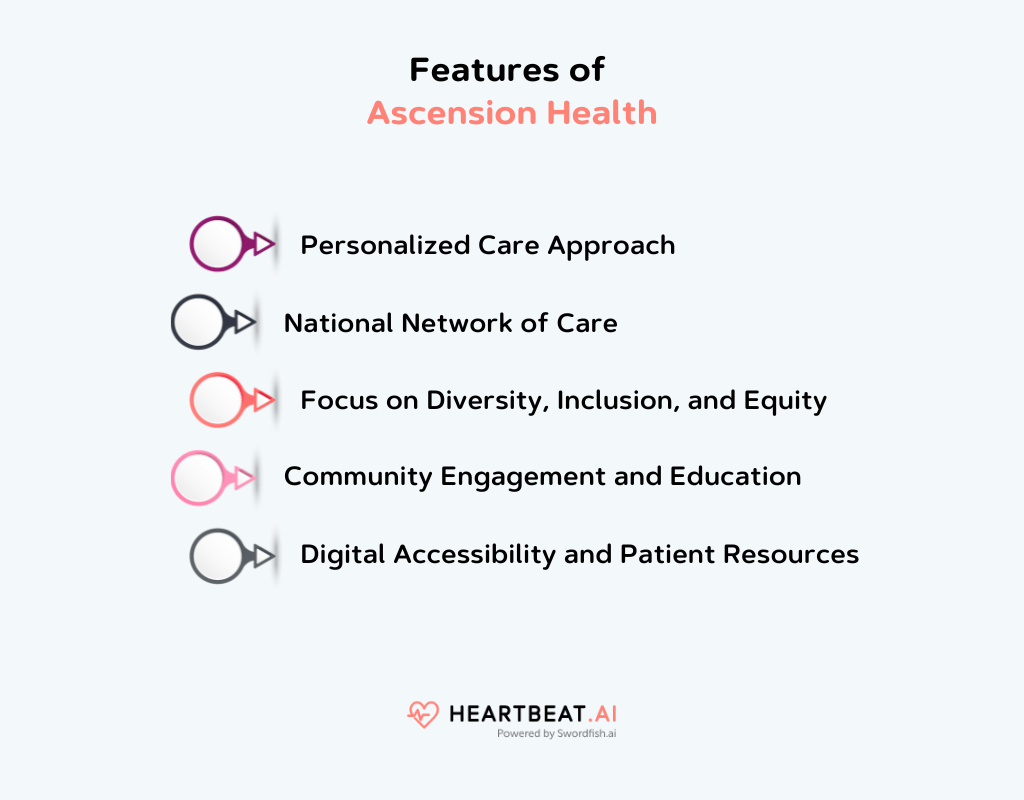
Personalized Care Approach
Ascension Health emphasizes providing personalized care, customized to the individual’s health and life circumstances. This approach ensures that each patient receives care that is specifically suited to their unique needs.
National Network of Care
They are connected to a national network of care, offering access to a wide range of doctors and specialists. This extensive network allows patients to receive comprehensive care, regardless of their specific health needs.
Focus on Diversity, Inclusion, and Equity
Ascension Health has a strong commitment to diversity, inclusion, and equity. Their ABIDE framework (Appreciation, Belongingness, Inclusivity, Diversity, Equity) reflects a dedication to addressing racism and systemic injustice, both in healthcare and employment opportunities.
Community Engagement and Education
They offer various educational classes, special community events, and support groups, indicating a commitment to community engagement and patient education.
Digital Accessibility and Patient Resources
Ascension Health provides online access to medical records and other patient resources. This highlights their commitment to digital accessibility and patient convenience.
Pros
- Focus on charity care and community health.
- Comprehensive range of medical services.
- Strong commitment to mission-driven healthcare.
- Telemedicine options expand accessibility.
- Emphasis on ethical and values-based care.
Cons
- Limited presence in certain regions.
- Complex bureaucracy may slow decision-making.
Our Review of Ascension Health
Through our analysis of Ascension Health, we’ve uncovered a blend of commendable aspects and areas needing attention. A standout feature is their extensive service range, offering diverse medical treatments under one roof.
Many patients report high satisfaction with the compassionate care provided by their medical staff. However, we’ve noted some challenges in appointment scheduling and wait times, which can be a source of frustration for patients.
While Ascension Health provides a broad spectrum of services with a caring touch, enhancing their appointment system could significantly improve patient convenience and satisfaction.
Other 22 Companies of Integrated Delivery Networks
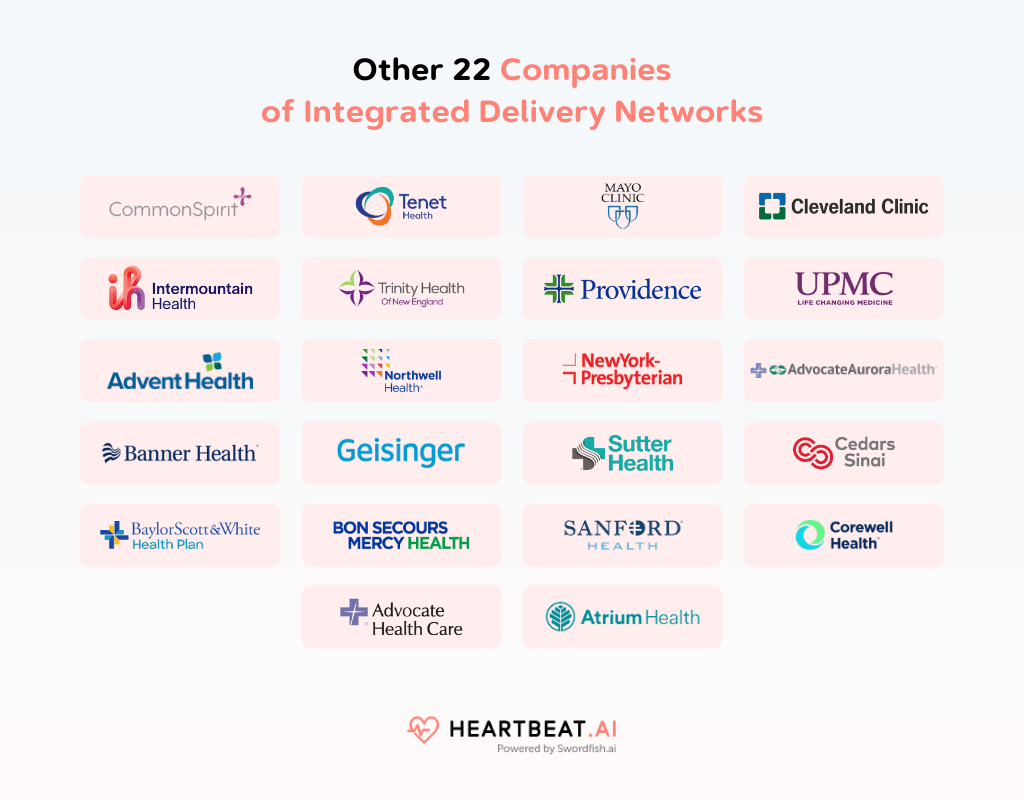
Discover 22 companies that are part of Integrated Delivery Networks (IDNs), working together to provide better healthcare services and support for patients.
1. CommonSpirit Health
CommonSpirit Health provides healthcare services, including hospitals and clinics, to improve community health. They stand out in integrated delivery networks for their widespread presence and commitment to accessible care, focusing on both physical and spiritual well-being.
About CommonSpirit Health
- Founding Team: Wright L.Lassiter III, Marvin O’Quinn, Suja Chandrasekaran, Tom McGinn
- Founding Year: 2019
- Company Size: 150,000
2. Tenet Healthcare
Tenet Healthcare operates hospitals and healthcare facilities, offering essential medical services. They excel in integrated delivery networks for their emphasis on quality care and innovation, making healthcare more efficient and patient-focused.
About Tenet Healthcare
- Founding Team: Ronald Rittenmayer, Saum Sutaria
- Founding Year: 1969
- Company Size: 102,000
3. Mayo Clinic
Mayo Clinic is renowned for medical research and care, offering comprehensive treatment options. Their standout feature in integrated delivery networks is their focus on patient-centered care, cutting-edge research, and education, contributing to advancements in medicine.
About Mayo Clinic
- Founding Team: Dr. William Worrall Mayo
- Founding Year: 1846
- Company Size: 76,000
4. Cleveland Clinic
Cleveland Clinic is recognized for its outstanding healthcare services, specializing in heart care and surgery. It stands out for its excellence in patient care, research, and education within integrated delivery networks, prioritizing innovative treatments and patient outcomes.
About Cleveland Clinic
- Founding Team: Frank Bunts
- Founding Year: 1921
- Company Size: 77,000
5. Intermountain Healthcare
Intermountain Healthcare offers a range of healthcare services, focusing on preventive care and wellness. Their distinction in integrated delivery networks comes from their dedication to community health and sustainable healthcare practices, ensuring high-quality, accessible care.
About Intermountain Healthcare
- Founding Team: Rob Allen
- Founding Year: 1975
- Company Size: 59,000
6. Trinity Health
Trinity Health provides comprehensive healthcare services, emphasizing community outreach and compassionate care. They are notable in integrated delivery networks for their holistic approach to health, addressing both physical and spiritual needs of patients.
About Trinity Health
- Founding Team: Michael Slubowski and James Bentley
- Founding Year: 2000
- Company Size: 120,000
7. Providence Health System
Providence Health System delivers healthcare services with a focus on compassionate care. They excel in integrated delivery networks through their mission-driven approach to health and wellness, serving communities with dedication and a commitment to quality care.
About Providence Health System
- Founding Team: Mother Joseph and four Sisters of Providence
- Founding Year: 1859
- Company Size: 120,000
8. University of Pittsburgh Medical Center (UPMC)
University of Pittsburgh Medical Center (UPMC) combines patient care, research, and education. It stands out in integrated delivery networks for its innovative healthcare solutions and commitment to advancing medical knowledge and patient care.
About University of Pittsburgh Medical Center (UPMC)
- Founding Team: Louise Lyle
- Founding Year: 1893
- Company Size: 95,000
9. AdvanetHealth
AdventHealth focuses on holistic healthcare, integrating physical, emotional, and spiritual well-being. They are distinguished in integrated delivery networks for their person-centered care and commitment to improving health outcomes through compassionate care.
About AdventHealth
- Founding Team: Terry Shaw
- Founding Year: 1973
- Company Size: 80,000
10. Northwell Health
Northwell Health provides a wide range of healthcare services, emphasizing innovation and quality care. They stand out in integrated delivery networks for their leadership in medical excellence and dedication to community health.
About Northwell Health
- Founding Team: Michael J. Dowling
- Founding Year: 1997
- Company Size: 81,000+
11. NewYork-Presbyterian Hospital
NewYork-Presbyterian Hospital offers comprehensive medical services, renowned for its clinical excellence. It stands out in integrated delivery networks for its commitment to innovative patient care and leading-edge research.
About NewYork-Presbyterian Hospital
- Founding Team: James Lenox
- Founding Year: 1993
- Company Size: 47,000
12. Advocate Aurora Health
Advocate Aurora Health delivers healthcare services focusing on wellness and preventive care. They are notable in integrated delivery networks for their approach to holistic health, integrating innovative care models to improve patient outcomes.
About Advocate Aurora Health
- Founding Team: Jim Skosbergh
- Founding Year: 1984
- Company Size: 75,000
13. Banner Health
Banner Health provides healthcare services across multiple states, focusing on making healthcare easier to access. They stand out for their use of technology and innovation in integrated delivery networks, improving patient care and experience.
About Banner Health
- Founding Team: Peter S. Fine
- Founding Year: 1999
- Company Size: 50,000
14. Geisinger Health
Geisinger Health combines healthcare services with research and education, focusing on innovative care. They are distinguished in integrated delivery networks for their commitment to patient-centered care and advancements in medical practice.
About Geisinger Health
- Founding Team: Abigail Geisinger
- Founding Year: 1915
- Company Size: 24,000
15. Sutter Health
Sutter Health offers comprehensive healthcare services, emphasizing high-quality care and patient satisfaction. They stand out in integrated delivery networks for their focus on community health and innovative care solutions.
About Sutter Health
- Founding Team: John Sutter
- Founding Year: 1921
- Company Size: 53,000
16. Cedars-Sinai Health System
Cedars-Sinai Health System is renowned for its clinical excellence and research, offering specialized care. They excel in integrated delivery networks for their dedication to patient care, innovation, and leading medical advancements.
About Cedars-Sinai Health System
- Founding Team: Kaspare Cohn
- Founding Year: 1902
- Company Size: 10,000+
17. Baylor Scott and White Health
Baylor Scott and White Health provides a range of healthcare services, focusing on comprehensive care and wellness. They stand out in integrated delivery networks for their commitment to quality care and innovation in patient health.
About Baylor Scott and White Health
- Founding Team: Dr. Arthur C. Scott and Dr. Raleigh R. White Jr
- Founding Year: 1897
- Company Size: 49,000+
18. Bon Secours Mercy Health
Bon Secours Mercy Health offers healthcare services with a focus on compassionate care and community wellness. They are notable in integrated delivery networks for their mission-driven approach and dedication to accessible, quality healthcare.
About Bon Secours Mercy Health
- Founding Team: John Starcher
- Founding Year: 1983
- Company Size: 60,000+
19. Sanford Health
Sanford Health delivers healthcare services across a broad region, focusing on community health and innovation. They stand out in integrated delivery networks for their commitment to advancing healthcare and improving patient outcomes.
About Sanford Health
- Founding Team: Bill Gassen and Nate White
- Founding Year: 1894
- Company Size: 47,000+
20. Spectrum Health
Spectrum Health provides comprehensive healthcare services, emphasizing innovation and quality care. They are distinguished in integrated delivery networks for their dedication to patient wellness and leading-edge healthcare solutions.
About Spectrum Health
- Founding Team: Tina Freese-Decker and Julie Fream
- Founding Year: 1997
- Company Size: 39,000
21. Advocate Health Care
Advocate Health Care offers a range of healthcare services, focusing on patient-centered care and wellness. They excel in integrated delivery networks for their commitment to quality care and innovative approaches to health improvement.
About Advocate Health Care
- Founding Year: 1897
- Company Size: 150,000
22. Carolinas Healthcare System (Atrium Health)
Carolinas HealthCare System (Atrium Health) delivers comprehensive healthcare services, focusing on patient care and community health. They stand out in integrated delivery networks for their dedication to improving health outcomes and their innovative care models.
About Carolinas Healthcare System (Atrium Health)
- Founding Team: Jane Wilkes
- Founding Year: 1876
- Company Size: 60,000
What to Consider When Choosing the Best Integrated Delivery Networks?
Choosing the best IDNs is a significant decision for healthcare organizations. To make this choice in an engaging and comprehensive manner, here are key factors to consider:
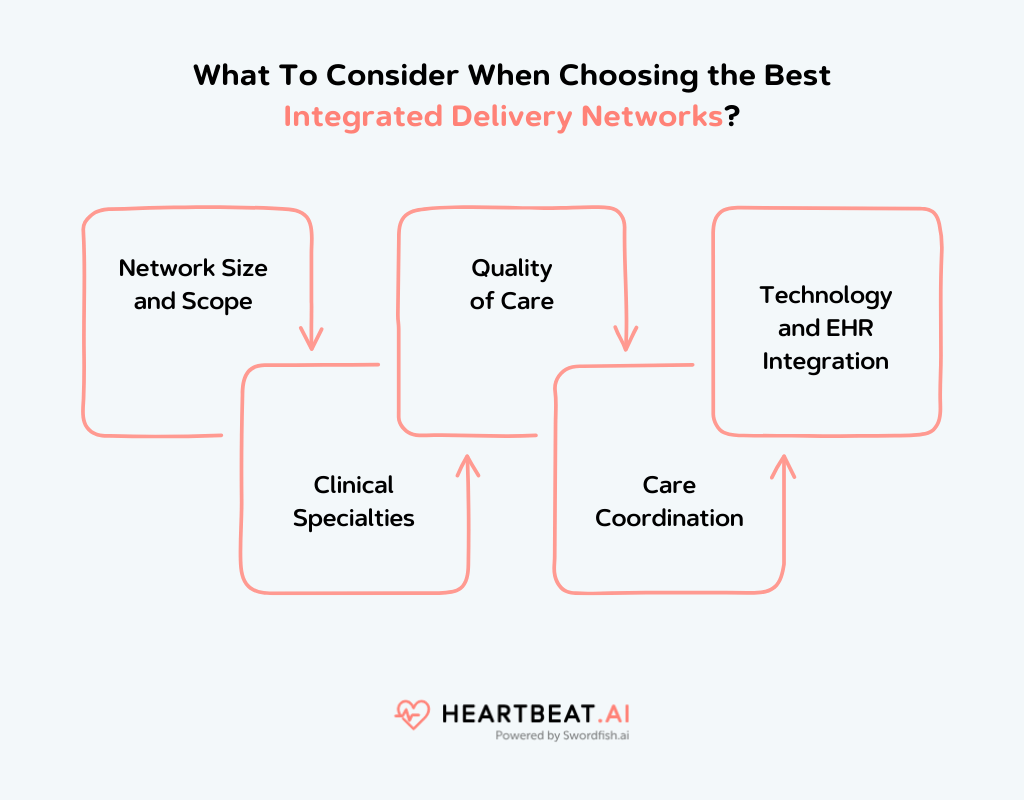
Network Size and Scope
You should assess the size and geographical reach of the IDN. Consider whether it covers the regions where your patients are located and whether it offers the range of services you need.
Clinical Specialties
Always examine the IDN’s clinical specialties and expertise. Ensure they have the necessary specialists and facilities to support your patient population.
Quality of Care
You should investigate the IDN’s track record in terms of quality of care, patient outcomes, and safety. Look for data on infection rates, readmission rates, and other quality metrics.
Care Coordination
Always evaluate the IDN’s ability to coordinate care across various healthcare settings, including hospitals, clinics, and outpatient centers. Effective care coordination can improve patient outcomes and reduce costs.
Technology and EHR Integration
Always check whether the IDN uses a compatible Electronic Health Record (EHR) system that can seamlessly exchange patient data with your organization. Integration of technology is vital for information sharing and continuity of care.
Find the Best List of Integrated Delivery Networks
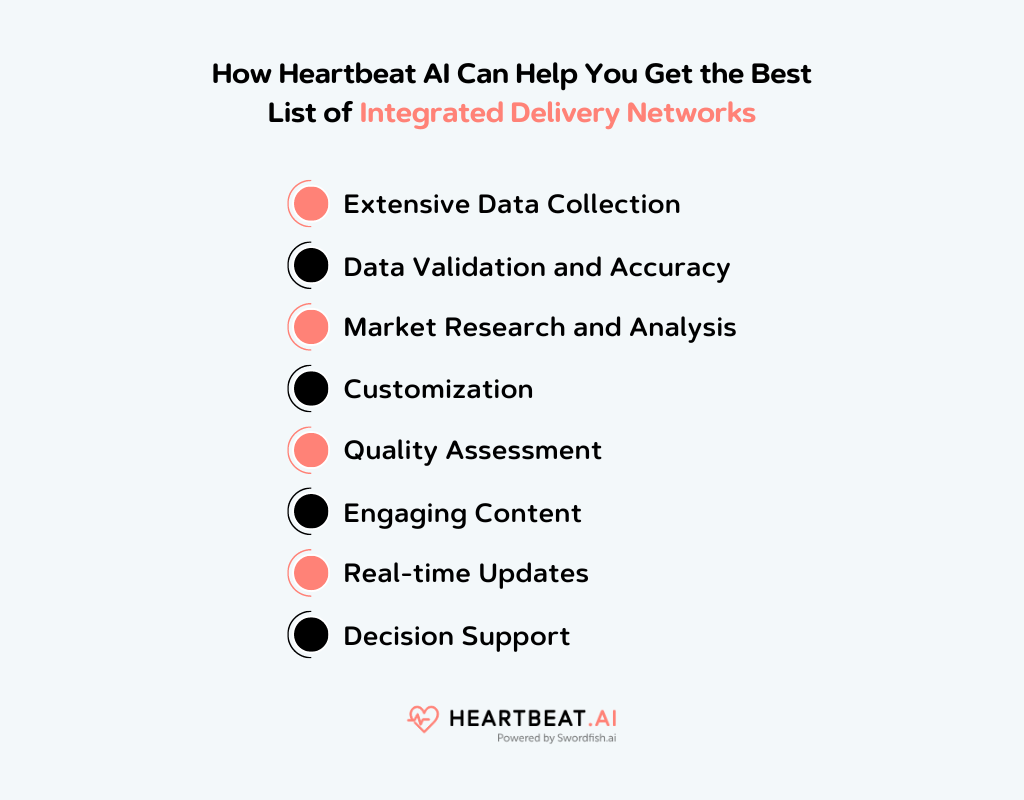
Heartbeat AI can play a crucial role in helping you obtain an engaging and comprehensive list of IDNs. In this article, we will explore how Heartbeat AI can assist you.
Extensive Data Collection
Heartbeat AI is proficient at collecting vast amounts of data from the official 200 sources. The sources include healthcare databases, industry reports, news articles, and official websites of healthcare organizations. It can extract information about IDNs, their locations, affiliations, services, and leadership.
Data Validation and Accuracy
One of the key advantages of Heartbeat AI is its ability to validate and cross-reference data. This ensures that the list of IDNs you receive is accurate and up-to-date. Also minimizes the risk of relying on outdated or incorrect information.
Market Research and Analysis
Heartbeat AI can provide you with valuable insights into the healthcare industry, including trends, mergers, acquisitions, and competitive analysis. This information helps you understand the dynamics of IDNs and their roles in the evolving healthcare landscape.
Customization
Heartbeat AI can customize the list of IDNs to meet your specific criteria. Heartbeat AI can customize a list of IDNs to meet your specific preferences, whether it’s based on region, medical specialties, or affiliations.
Quality Assessment
Heartbeat AI can analyze the reputation and performance of different IDNs by considering factors such as patient satisfaction scores, clinical outcomes, and financial stability. This helps you identify high-performing and reputable IDNs.
Engaging Content
To keep you engaged and informed, Heartbeat AI can present the list of IDNs in an engaging format. Whether it’s through visually appealing charts, interactive maps, or informative articles, the information will be conveyed in a way that captures your interest.
Real-time Updates
The healthcare industry is dynamic, with constant changes in the status and structure of IDNs. Heartbeat AI can provide real-time updates to ensure that your list remains current and reflective of the latest developments.
Decision Support
Heartbeat AI can offer insights and recommendations to assist you in making informed decisions. Whether you are a healthcare professional looking for potential partnerships or an investor seeking opportunities, Heartbeat AI’s analysis tool can guide your choices.
Conclusion
Summing up, we’ve examined what integrated delivery networks (IDNs) are and the types of IDNs. Also thoroughly assess the top IDNs features, advantages, disadvantages, and more. We’ve underscored the vital role that IDNs play in healthcare, promoting collaboration among healthcare entities to enhance patient care.
IDNs are the foundation of modern healthcare, simplifying services and improving patient outcomes. With the insights shared here, you’re well-prepared to make a thoughtful choice. We trust that this guide has aided you in discovering the ideal IDN that aligns perfectly with your healthcare needs.
Frequently Asked Question
What is the difference between an IDN and a health system?
An IDN, or Integrated Delivery Network, is a network of healthcare providers and facilities working together to deliver coordinated care. While a health system is a broader term encompassing all entities involved in healthcare, including IDNs, hospitals, clinics, and insurers.
How do integrated delivery networks differ from traditional healthcare systems?
IDNs focus on seamless coordination and collaboration among healthcare entities to improve patient outcomes, while traditional systems may operate independently.
What is an IDN hospital?
An IDN hospital is a medical facility within a network of healthcare providers. They collaborate to offer comprehensive and coordinated healthcare services, with the goal of improving patient outcomes and healthcare delivery efficiency.

